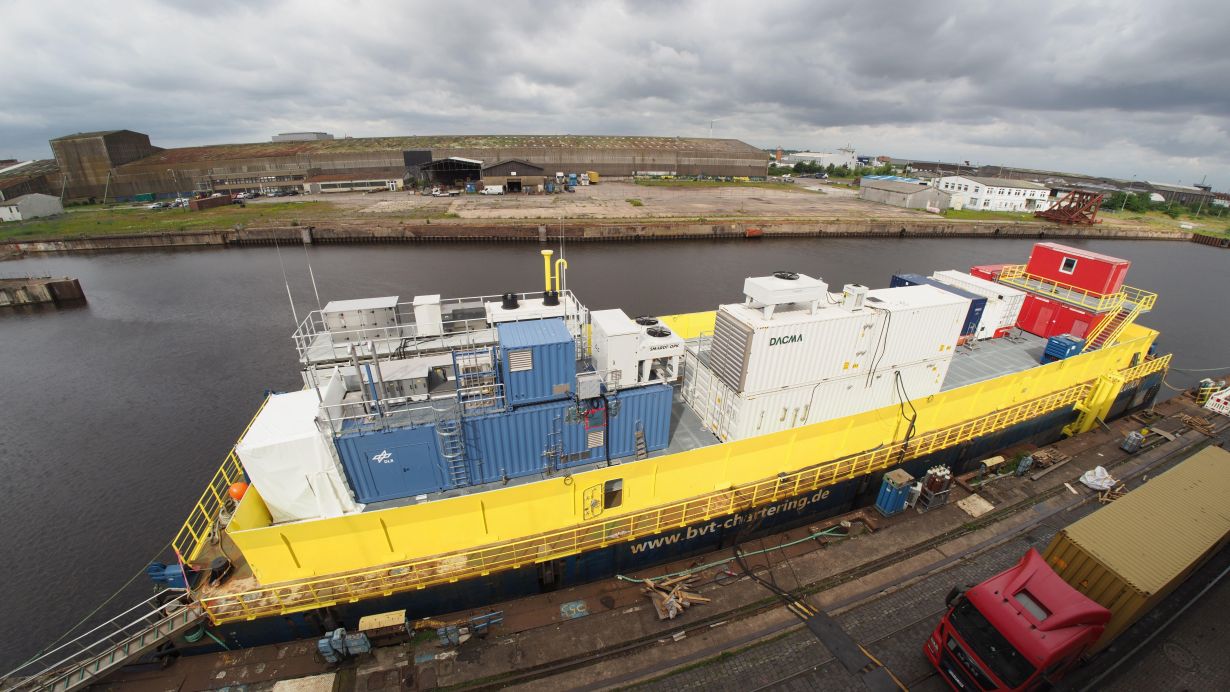
Off-grid, modular, and seaworthy: KIT (Karlsruhe Institute of Technology) and partners intend to produce synthetic fuels on a floating platform using wind energy, seawater, and ambient air. For this purpose, the "PtX-Wind" project was launched under the H2Mare lead project. A corresponding modular plant was installed on a barge and lies operational at anchor in Bremerhaven. Later this year, it will start producing synthetic fuel directly on the sea just off the Helgoland Island.
The first floating test platform demonstrating a complete power-to-X process chain for synthetic fuels was opened on July 08, 2025 under the H2Mare hydrogen lead project funded by the Federal Ministry of Research, Technology and Space. "We wanted to test the entire planning process including approval, construction, and real-world operation of the plant to learn how to draw up concepts for building larger production platforms," said Professor Roland Dittmeyer, Head of KIT's Institute for Micro Process Engineering and coordinator of the "PtX-Wind" H2Mare project during the opening ceremony in Bremerhaven.
Fuels from Wind, Water, and Air
For the production of synthetic fuels, the novel modular plant will use wind energy, seawater, and ambient air. Accordingly, the H2Mare test platform is equipped with a direct air capture plant (DAC) for recovering CO2 from the ambient air, a facility for the desalination of seawater, and a high-temperature electrolysis unit that generates hydrogenous synthesis gas. The latter will be used as source material for the Fischer-Tropsch synthesis that converts green hydrogen and CO2 into fuels. Thanks to the modular structure of the system, the entire process chain can be operated off-grid in a dynamic way, adapted to the availability of renewable electricity from offshore wind energy.
Offshore Operation Starting in July 2025
The researchers will start test operation of the platform in July 2025, at first in the port of Bremerhaven and then continuing on the open sea off Helgoland. Besides testing the flexible operation of the entire process chain, they also intend to investigate the maritime impacts and material properties as well as the regulatory conditions in actual operation without connection to the power grid. The insights gained here will be incorporated into the development of larger production platforms that can be coupled with wind turbines.
Apart from the offshore production of e-fuels, the "PtX-Wind" researchers in the H2Mare project will also explore alternative Power-to-X synthesis methods. This includes the production of liquid methane, methanol, and ammonia, which is being investigated at KIT.
About H2Mare and PtX-Wind
H2Mare is one of three hydrogen lead projects funded by the Federal Ministry of Research, Technology, and Space (BMFTR). The project focuses on investigating the offshore production of green hydrogen and other Power-to-X products from wind energy. With its research, H2Mare contributes to the implementation of the national hydrogen strategy.
In the "PtX-Wind" H2Mare project, KIT and partners from academia and industry are researching the further processing of green hydrogen generated at sea into so-called derivatives, i.e. downstream products such as e-fuels. KIT developed the test platform jointly with the H2Mare project partners: the Institute for Technical Thermodynamics of the German Aerospace Center (DLR) and TU Berlin.
More about the KIT Energy Center
Being "The Research University in the Helmholtz Association", KIT creates and imparts knowledge for the society and the environment. It is the objective to make significant contributions to the global challenges in the fields of energy, mobility, and information. For this, about 10,000 employees cooperate in a broad range of disciplines in natural sciences, engineering sciences, economics, and the humanities and social sciences. KIT prepares its 22,800 students for responsible tasks in society, industry, and science by offering research-based study programs. Innovation efforts at KIT build a bridge between important scientific findings and their application for the benefit of society, economic prosperity, and the preservation of our natural basis of life. KIT is one of the German universities of excellence.






